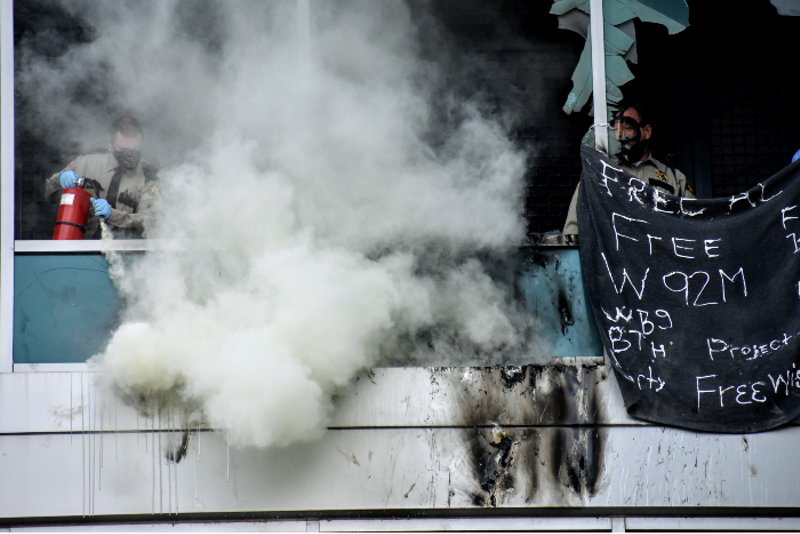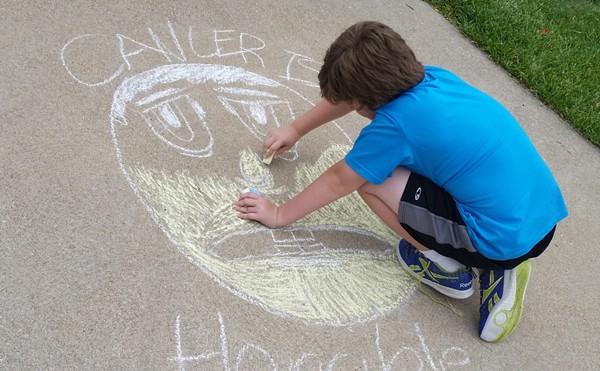
DOYLE MURPHY
A St. Louis sheriff's deputy uses a fire extinguisher on burning debris after a detainee revolt in the City Justice Center.
People detained in a city jail say corrections officers routinely abused them and others, beating them, shutting off their water in retaliation for the slightest offenses — or no offenses at all — and stuffing them in enclosed rooms before filling the air with mace to let them "marinate."
Three detainees are now suing the city and nine corrections employees over treatment at the City Justice Center. The downtown jail has been the site of multiple fiery uprisings in the past six months, the result, detainees and their advocates say, of inhumane conditions and unanswered grievances.
See Also: St. Louis Inmates Revolt — Again — at City Justice Center Jail
“I had a corrections officer tell me, ‘We will kill your ass in here.’ Somebody has to do something,” Darnell Rusan, one of the plaintiffs, said in a statement released by his attorneys. “People are going to do what you let them do, and I hope that this lawsuit is an attempt to stop that.”
Rusan is joined in the suit by Derrick Jones and Jerome Jones. They're being represented by attorneys from a quartet of organizations: ArchCity Defenders, Roderick & Solange MacArthur Justice Center, Saint Louis University School of Law Legal Clinics, and Rights Behind Bars.
All three men were locked up at CJC. Jerome Jones was jailed for more than two years before he was acquitted and released. The other two are still there.
The suit describes multiple incidents involving corrections officers and their superiors.
In one example from February 9, Jerome Jones was hauled into a three-by-five-foot visiting booth and maced for refusing to move from a single cell to a double cell, according to the suit. Lt. Javan Fowlkes, who is a defendant in the suit, allegedly filled the air with mace before they locked Jones inside for about 25 minutes while he begged for help and tried to suck in fresh air from a crack at the bottom of the door. Even when they let him out, he wasn't allowed to shower for another day, according to the suit.
Water had been shut off in his cell that day, which the men claim happened frequently as a way to punish and control detainees.
"To this day, Jerome still experiences respiratory issues which, upon information and belief, are caused by his exposure to excessive mace at CJC," the suit says.
In another incident, Rusan claims he angered a corrections officer during a strip search by asking, "Do you like actually like this job?" In retaliation, Rusan was searched again before Fowlkes maced Rusan's nude body, fogged the air of a visiting room with even more mace and left him inside for four hours, the suit says.
According to jail policies, mace is only to be used as a last resort and not against people who are restrained or otherwise not an active threat, but the three and their advocates claim corrections officers routinely used it without warning to punish detainees.
Derrick Jones ran afoul of guards in December 2020 when he asked to be moved to a different cell because he suspected his cellmate had COVID-19. The suit says guards retaliated by macing him without warning, knocking him down, kicking him in the head and handcuffing him. Fowlkes is then accused of macing him two more times, once there while Jones was handcuffed and again later in a medical unit where Jones was awaiting treatment.
"Lt. Fowlkes came to the room, opened the door, sprayed Derrick with mace for a third time, and closed the door, saying, 'Let him marinate,'" the suit says.
Jones then spent the next eight days in solitary confinement without a shower. He is now back in solitary and has been there more than 160 days, the suit says.
The RFT has reached out to the city for comment and will update this story if we get a response.
Along with allegations of repeated, gratuitous use of mace, the suit focuses on water access. The city has previously said water has been shut off at times, but only briefly and only when detainees have stopped up toilets and are flooding the units.
The suit acknowledges that detainees have stopped up toilets, but the men insist that's rarely the reason for water shutoffs. Instead, corrections officers and supervisors will cut access to entire units to punish one or two individuals. Sometimes, whether men in the units get water has nothing to do with the detainees at all, according to the suit.
"If Lt. Fowlkes comes to work angry, he will immediately turn off the water," the suit says.
Cells in the jail have a combination toilet and sink. If jailers shut off water to the toilets, the water for drinking, cleaning up and hydrating microwave foods goes, too. After uprisings, in which detainees escaped their cells by jimmying defective locks and took over entire units, water was shut off for extended periods of time, leaving the men with nothing to drink and toilets that eventually overflowed because they couldn't be flushed, the suit says.
Attorneys for the men describe the repeated water shutoffs — and constant threats of water shutoffs — as a violation of internationally recognized human rights, "as set forth most notably in the 'Nelson Mandela Rules'" that define minimum standards for prisoners.
"I've been in here for 6 months. It feels crazy to be without my family," Derrick Jones said in a statement. "My daughter has been born since I was jailed, and I can't even hold her yet. I'm tired. I want to speak up and say something. I want to change the future so it doesn't have to happen to someone else."





